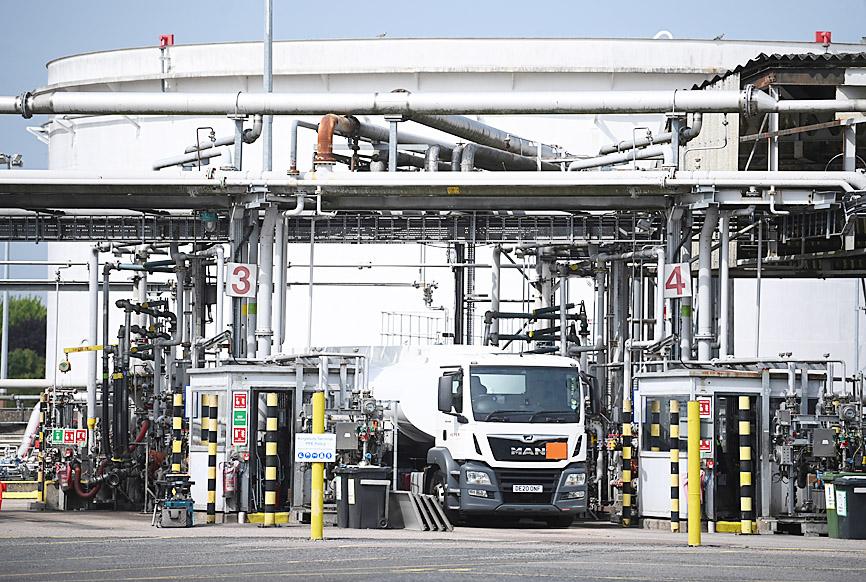Oil fell for a second consecutive month as a deteriorating demand outlook offset concerns about tight physical supplies.
West Texas Intermediate (WTI) for September delivery on Friday rose 2.28 percent to US$98.62, bringing this week’s gain to 4.14 percent.
Brent crude for September delivery rose 2.1 percent to US$103.97, up 0.75 percent from a week earlier.

Photo: EPA-EFE
Futures nevertheless recorded their first back-to-back monthly decline since 2020 as fears of an economic slowdown fueled bearish sentiment across markets.
The US economy shrank for a second quarter as rampant inflation undercut consumer spending, while Citigroup Inc said there are signs the oil market is moderating.
Still, Exxon Mobil Corp does not see any signs of major fuel demand destruction.
“I wouldn’t tell you that we’re seeing something that would say we are in a recession, or near recession,” Exxon Mobil chief executive officer Darren Woods said.
While oil has given up most of the gains seen following Russia’s invasion of Ukraine in late February, the US benchmark is still up more than 30 percent this year. The surge in energy prices has underpinned oil producer earnings, with Exxon and Chevron Corp joining Shell PLC with record profits. A weaker US dollar has also helped to boost commodity prices.
“The underlying fundamentals for oil still remain quite strong,” said Edward Bell, senior director of market economics at Emirates NBD Bank PJSC. “There are serious risks around supply: sanctions on Russia that will kick in more meaningfully later this year, OPEC+ topping out in terms of what it can add to the market and the supply response in the US not coming on.”
Oil production in Texas and New Mexico dipped in May, US government data showed, in the latest sign that growth is slowing the prolific Permian Basin. Growth has largely stalled even as producers add drilling rigs due to rising inflation in everything from labor to equipment costs.
The spread between WTI and Brent, also known as the arb, has widened as a reduction in Russian crude flows tightened markets in Europe. The global benchmark was at a premium of around US$11 to US crude, compared with about US$6 at the start of the month.
The move is exacerbated by Brent crude’s September contract expiry, but the October spread is also wide at about US$7 a barrel.
“With no major signs of fuel demand destruction, oil seems like it will soon find a home above the US$100 a barrel mark,” Oanda Corp senior market analyst Edward Moya said.

CHIP WAR: Tariffs on Taiwanese chips would prompt companies to move their factories, but not necessarily to the US, unleashing a ‘global cross-sector tariff war’ US President Donald Trump would “shoot himself in the foot” if he follows through on his recent pledge to impose higher tariffs on Taiwanese and other foreign semiconductors entering the US, analysts said. Trump’s plans to raise tariffs on chips manufactured in Taiwan to as high as 100 percent would backfire, macroeconomist Henry Wu (吳嘉隆) said. He would “shoot himself in the foot,” Wu said on Saturday, as such economic measures would lead Taiwanese chip suppliers to pass on additional costs to their US clients and consumers, and ultimately cause another wave of inflation. Trump has claimed that Taiwan took up to

A start-up in Mexico is trying to help get a handle on one coastal city’s plastic waste problem by converting it into gasoline, diesel and other fuels. With less than 10 percent of the world’s plastics being recycled, Petgas’ idea is that rather than letting discarded plastic become waste, it can become productive again as fuel. Petgas developed a machine in the port city of Boca del Rio that uses pyrolysis, a thermodynamic process that heats plastics in the absence of oxygen, breaking it down to produce gasoline, diesel, kerosene, paraffin and coke. Petgas chief technology officer Carlos Parraguirre Diaz said that in

Japan intends to closely monitor the impact on its currency of US President Donald Trump’s new tariffs and is worried about the international fallout from the trade imposts, Japanese Minister of Finance Katsunobu Kato said. “We need to carefully see how the exchange rate and other factors will be affected and what form US monetary policy will take in the future,” Kato said yesterday in an interview with Fuji Television. Japan is very concerned about how the tariffs might impact the global economy, he added. Kato spoke as nations and firms brace for potential repercussions after Trump unleashed the first salvo of

SUPPORT: The government said it would help firms deal with supply disruptions, after Trump signed orders imposing tariffs of 25 percent on imports from Canada and Mexico The government pledged to help companies with operations in Mexico, such as iPhone assembler Hon Hai Precision Industry Co (鴻海精密), also known as Foxconn Technology Group (富士康科技集團), shift production lines and investment if needed to deal with higher US tariffs. The Ministry of Economic Affairs yesterday announced measures to help local firms cope with the US tariff increases on Canada, Mexico, China and other potential areas. The ministry said that it would establish an investment and trade service center in the US to help Taiwanese firms assess the investment environment in different US states, plan supply chain relocation strategies and